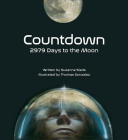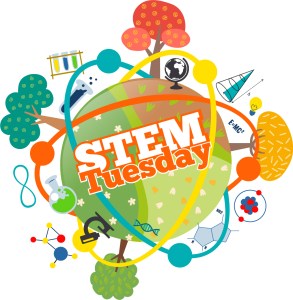
Reading books from this month’s list confirmed something I instinctively knew – I am nowhere near adventurous enough to be an astronaut. Here are my brief takes on the books I read.
Countdown: 2979 Days to the Moon
by Suzanne Slade, illustrated by Thomas Gonzalez
Countdown tells the story of how mankind journeyed to (and first walked on) the moon. Unlike most books about astronauts, this book is told in free verse poetry. It is also primarily illustrated, gorgeously, by Thomas Gonzalez.
 Lost in Outer Space
Lost in Outer Space
by Tod Olson
This book screams for a read-aloud. Once you get into it, it gets increasingly difficult to put down. Olson does a great job of telling Apollo 13’s story. He puts his own spin on it by sprinkling the perspective of Commander Jim Lovell’s daughter Barbara (a teenager at the time) throughout.
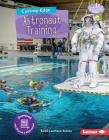 Cutting-Edge Astronaut Training
Cutting-Edge Astronaut Training
by Karen Latchana Kenny
This book is a quick but informative read, covering how astronauts train to go into space.
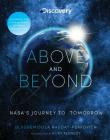
Above and Beyond: NASA’s Journey to Tomorrow
by Olugbemisola Rhuday-Perkovich
This book looks at NASA from the beginning of the space program through to expectations for the future. One thing I love about this book is that it weaves in what is happening in the world at various points in time and how those things impact NASA’s missions.
Springboard From the Books
Each of these books has references to materials that readers can explore in order to delve more deeply into the subject matter. Look through the books and take some time to explore these materials, most of which are online.
You can also explore materials provided from author and publisher websites.
Tod Olson, Lost in Outer Space: http://todolson.com/resources/lost-in-outer-space-resources
Countdown: https://peachtree-online.com/portfolio-items/countdown
Suzanne Slade’s Book Resources: https://www.suzanneslade.com/contact-me
Suzanne Slade’s Great Space Resources: https://www.suzanneslade.com/great-space-resources
Explore Free Verse
Take a closer look at Coundown and challenge students to create their own free verse poetry. As an added challenge, have students use poetry as a means of writing nonfiction – whether it’s describing something or telling a nonfiction story.
Here are two great resources for looking at and developing some free verse:
https://www.poetry4kids.com/news/how-to-write-a-free-verse-poem
https://powerpoetry.org/actions/5-tips-writing-free-verse-poem
As a bonus, you can read about Suzanne Slade’s journey in writing this book here: https://picturebookbuilders.com/2018/08/countdown-2979-days-to-the-moon-giveaway
Signs of the Times
Pick an event from one of the books. Explore what was going on in the world at that point in time. Here are some questions you might want to answer:
What songs were popular? Listen to some.
What TV shows were people watching? Watch one.
What were people wearing?
What problems was the world facing at that time?
Who was the President of the United States? Who were the other world leaders?
What was the cutting-edge technology for that time?
Consider making a timeline of important world events, including one or more of the significant events mentioned in the book(s).
Who do you know who was alive during that time? Interview one or more people to get their perspective(s) on the event.
Consider Being an Astronaut
Do a little career exploration and determine if you have what it takes to be an astronaut.
What is NASA looking for in astronauts? Find out here: https://www.nasa.gov/audience/forstudents/postsecondary/features/F_Astronaut_Requirements.html
There is a short video where astronauts talk about what kinds of people NASA looks for in astronauts here: https://youtu.be/4fXsAvv96Gw.
Take an Astronaut test – would you be a good candidate? https://www.astronaut-test.com/quiz
NASA has a behind the scenes look at astronaut training from about 15 years ago. Poke around the information and read entries from an astronaut trainee’s journal here: https://spaceflight.nasa.gov/shuttle/support/training
Then answer the question. Do you have what it takes to be an astronaut? Why or why not?
Pick astronaut or another career and do a little research into it.
What kind of skills and/or training does it require?
What is a typical workday like?
What is the pay range?
One place to look for career information is the U.S. Bureau of Labor and Statistics: https://www.bls.gov/k12/students
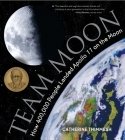
It takes many people to put astronauts up in space. One book that highlights a lot of these jobs is Team Moon: How 400,000 People Landed Apollo 11 on the Moon by Catherine Thimmesh.
Read this and/or look through NASA’s website to see what other careers help with space exploration. Do any of them interest you?
Other Ideas:
Look Into Life in Space
Take an online tour of the ISS in space with astronaut Sunita (Suni) Williams: https://youtu.be/06-Xm3_Ze1o
Or watch the 30 minute video A Day in the Life Aboard the International Space Station: https://www.nasa.gov/audience/foreducators/stem-on-station/dayinthelife
How is life in space similar to your life? How is it different?
Would you like to live in space? Why or why not?
Bonus: Can you find out what your home looks like from space?
Astronaut Biographies
There is so much information available on the NASA website. Here is where you can find a lot of the information related to astronauts: https://www.nasa.gov/astronauts.
Biographies for NASA’s active astronauts can be found here: https://www.nasa.gov/astronauts/biographies/active.
There are other links for information on former astronauts, international astronauts, and more.
Students could choose an astronaut to profile, explore the information provided, and write a biography about them.
I hope you have fun journeying into space with these books and activities.
****************************
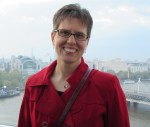
Janet Slingerland loves learning about science, history, nature, and (well) everything, which she then turns into a book. To find out more about Janet and her books, check out her website: janetsbooks.com
